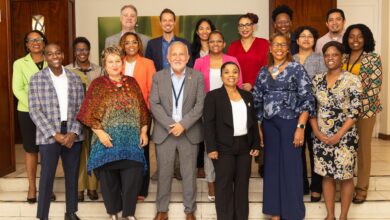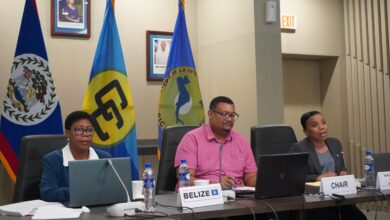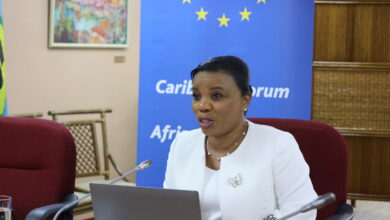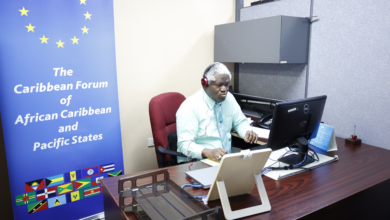(CARICOM Secretariat, Turkeyen, Greater Georgetown, Guyana) The pleasure is mine to welcome you all to this 11th European Development Fund Programming Seminar, a forum that we in the Caribbean Forum of African, Caribbean and Pacific States consider of critical importance to our development.
I wish to acknowledge the presence of the Commissioner for Development of the European Union. Commissioner Piebalgs, your attendance at this Seminar is highly appreciated and, in my view, reflects the importance the European Union attaches to its relations with CARIFORUM. On our part, through you Mr. Commissioner, we wish to express our deep appreciation for the continued support from the European Union, particularly at a time when some of your own EU Member States are experiencing fiscal, financial and economic challenges. This is clear evidence of the strength and durability of our relationship.
The CARIFORUM Region and the European Union share a long political and economic history. Our relationship is not stagnant. While it evolves, grows, changes and reacts to developing circumstances, it nevertheless is underpinned by certain constants such as a commitment to global peace, democracy, the rule of law and respect for human rights.
The European Union is the largest provider of grant resources to CARIFORUM, via National Indicative Programmes and through Regional Indicative Programmes. The resources provided through these two mechanisms as well as those disbursed through Intra-ACP Programmes, Joint ACP/EU Institutions and Budgetary Resources of the Commission of the European Union, have been significant and have contributed immensely to national and regional development in CARIFORUM.
Our current relationship is managed within the context of certain agreements and processes such as the ACP/EU Cotonou Agreement, the CARIFORUM-EU Joint Strategy, the CARIFORUM-EU Economic Partnership Agreement (EPA) and mutual conclusions and agreements reached through political and policy dialogue.
The Cotonou Agreement describes the general approach to regional cooperation and integration. It specifically states that “Cooperation shall provide effective assistance to achieve the objectives and priorities, which the ACP Countries have set themselves in the context of regional and sub-regional cooperation and integration”.
The CARIFORUM/EU Joint Strategy, endorsed by the European and CARIFORUM Council of Ministers, provides that “the guiding principles for the Joint Strategy are joint ownership, mutual accountability, solidarity, co-management and co-responsibility”. The Joint Strategy also promotes the following themes:
Theme I: Regional Integration and Cooperation in the Wider Caribbean, which foresees cooperation in areas which include:
Strengthening regional integration and cooperation processes;
Implementation of the CSME and the OECS Economic Union;
Effective EPA Implementation;
Reducing vulnerability and building resilience of SIDS;
Development of enterprise through private sector development;
Infrastructure networks;
Energy;
Education and skills development; and
Food and Nutrition Security.
The other themes – themes II, III and IV – cover the Reconstruction and Institutional Support to Haiti; Climate Change and Natural Disasters; and Crime and Security.
These themes were jointly identified for inclusion in the Joint Cooperation Strategy. I, therefore, anticipate that the Regional Programme for the 11th European Development Fund will be based on these thematic areas and that the distribution of resources between and within these thematic areas will reflect Caribbean Regional Priorities. Similarly, I anticipate that the National Indicative Programmes which will be discussed during this Seminar will reflect national priorities of CARIFORUM States.
Mr President, Mr. Commissioner, Ladies and Gentlemen, as in every meaningful and mature relationship, there are issues on which we differ. For example, elements of the new EU external aid policies are cause for concern for CARIFORUM. I refer specifically to the twin principles of differentiation and graduation from access to grant resources.
The use of per capita income to determine a country’s level of development and its need for grant and concessional financing, does not provide the true picture. Per capita income is, at best, an arithmetic ratio that does not address levels of poverty, distribution of income, levels of indebtedness, vulnerability, and the capacity to self-generate sustainable economic and social development. This is an area on which we welcome continued policy and political dialogue with our European Partners, particularly within the context of SIDS and the Post 2015 Development Agenda.
Today, notwithstanding challenges and differences related to differentiation and graduation, we are gathered to discuss the support which the European Union will provide to CARIFORUM for a Caribbean Regional Programme. Bilateral discussions will also be held on National Indicative Programmes with individual CARIFORUM Member States.
As we engage in discussions over the next two days on regional programming, a critical area which must permeate whatever interventions are eventually agreed to for financing from EDF resources, is that of capacity-building. Without human capacity development, CARIFORUM as a region cannot achieve global competitiveness, neither can it build sustainable economies. Similarly, we cannot achieve sustainable development without building institutions capable of continuing to deliver services when project related financing in particular areas would have ceased. The use of regional institutions in implementing regional and multi-country programmes must occupy high priority, as must the provision of institutional support to build permanent and sustainable capacities.
Finally, I want to address the process of regional programming itself, which we will formally commence today. Presentations on seminar topics will provide perspectives on programming, implementation and management of the Regional Programme. These presentations would have benefitted from intensive internal discussions within the institutions of the European Union. Similarly, the CARIFORUM Council of Ministers has had discussions on the overall approach to, and priorities for, the 11th EDF Caribbean Regional Programme. These discussions resulted in the endorsement of a Concept Paper, based primarily on the Joint CARIFORUM-EU Strategy already agreed to both by CARIFORUM and the European Union.
On Tuesday and Wednesday of this week, CARIFORUM also held consultations involving Member States, Caribbean OCTs and French DOMs, Regional Organisations and representatives of Caribbean non-state actors, including Civil Society.
I expect that both sets of deliberations will be brought to bear on what finally emerges as the agreed approach to the programming, implementation and management of the Regional Indicative Programme. I sincerely hope that we can have a successful Seminar which will assist in guiding a joint programming process.





